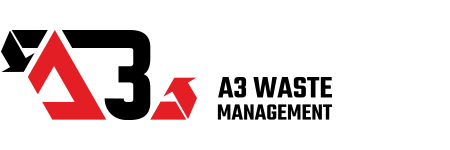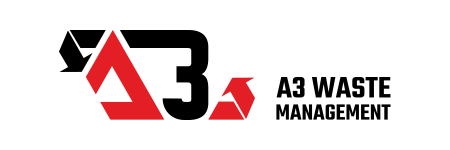Here at A3 Waste, we want our customers to know what they can and can’t put in a skip, especially when they are investing their time and money in hiring one of our skips. That’s why we have created this guide on what you can put in your skip and what you cannot.
What types of waste can you put in a skip?
General waste
The most common type of general waste we see going into a skip is what you would find in your normal household rubbish or recycling. Although we try to recycle as much of it as we can, general household or commercial waste often has to be sent to landfill because it cannot be reused.
If you are clearing your house or smaller room, we would recommend hiring a 4 yard skip, since these hold up to 40 bags of household rubbish.
Construction waste
For those undertaking larger domestic refurbishments or commercial rebuilding projects, a significant amount of construction waste can go in a skip. Construction waste includes, but isn’t limited to:
- Bricks and concrete
- Soil and builders sand
- Wall and floor tiles
- Electric cabling from rewiring projects
- Wallpaper and brushes
- Wooden panels
- Scrap metal (unless specified in the Waste Electronics and Electrical Equipment section further down this page)
Remember, certain construction waste items such as plasterboard, need to be disposed of differently, so if this is something that you need to dispose of, let your skip hire company know beforehand.
Alternatively, arrange to take it yourself to a local authority recycling centre. You will have to let them know beforehand it’s what you’re bringing.
Green waste
When it comes to garden waste, there is plenty you can put in a skip, but it’s important to remember the weight limits for each skip size. Common examples of garden waste you can put in a skip include:
- Grass, shrubbery and tree trimmings
- Fence panels
- Disassembled sheds
- Flower and smaller potted plants
- Garden ornaments
- Treated and untreated wood
If you are clearing your garden or you have a medium sized outdoor project you’re working on, we would recommend either a 6 yard or an 8 yard, as should give you the right amount of storage, without overfilling the skip.
What types of waste can you not put in a skip?
Hazardous waste
Hazardous waste refers to anything that could harm the environment or pose a risk to health or life. For example, asbestos is classified as hazardous waste and must be collected and disposed of in a specific way to prevent health risks.
Other examples of hazardous waste include, but aren’t limited to:
- Chemicals, such as brake fluid
- Pesticides, acids and alkalis
- Oil and fuel
- Fluorescent tubes
Electronic waste
Waste Electronics and Electrical Equipment (WEEE) covers most household or commercial items and must be disposed of at specific local authority recycling centres. WEEE items include, but aren’t limited to:
- Batteries
- Laptops and desktop computers
- Bulbs
- Appliances
- Televisions
- Mobile phones
Medical waste
It should come as no surprise that medical waste cannot be put in a skip. Disposing of any form of medical waste, whether used needles or bandages, in a skip can pose a significant risk of infection to anyone handling the skip and waste. Examples of medical or clinical waste include:
- Human or animal skin
- Blood or any bodily fluids
- Drugs or any other medications
- Used swabs or dressings
- Syringes or any other sharp objects
- Used sanitary items
If you have medical waste that needs to be disposed of, you should contact your local authority and seek their advice.
Paints and solvents
Alongside medical waste, paints and solvents must not be placed in a hired skip. These need to be disposed of at a licensed recycling centre. We recommend contacting your local authority or searching online to find the nearest one.
The reason behind this is that paints or solvents placed in a skip can damage its structure and leak into the surrounding environment, harming the soil and ecosystem. It also poses a risk if the liquid comes into contact with anyone who has a skin condition. In serious cases, unidentified liquids have caused chemical burns.
As you can see, there is a lot to consider when you’re hiring a skip. We hope this article has given you all the information you need to make an informed skip hire decision, but if you’re still unsure, get in touch with us and our team will be happy to help.
A3 Waste Management provides a simple Skip Wait & Load or Skip Hire service for domestic and commercial clients across the South Coast. For more information, or to book your skip, contact us today.

